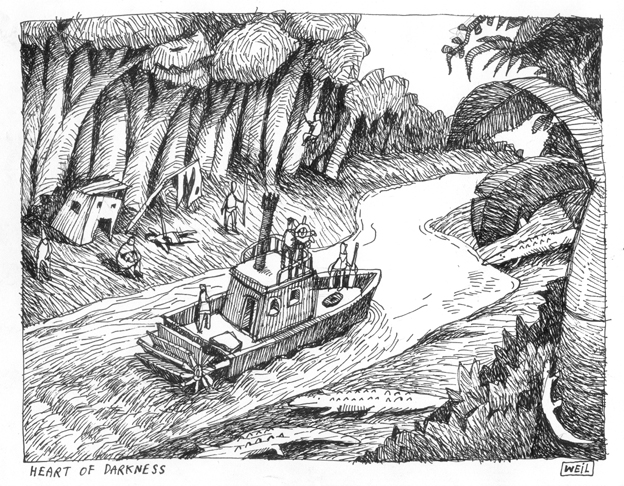Search This Blog
Sunday, November 11, 2012
Apocalypse Then: Heart of Darkness by Joseph Conrad
Thanks to audiobooks, and a job which requires long road trips, I've been able to "read" a lot more than normal. And because of the selection, I've been "broadening my horizons" beyond the books I would normally choose. Case in point is Heart of Darkness--I've had a hardbound copy of it for over a decade, collecting dust in my "classics" section, but just never got around to reading it. When I found an audiobook version in the library, though, I figured there's no time like the present.
What intrigued me the most about this book was that I knew Apocalypse, Now was a film adaptation of it--transposed into South Vietnam circa 1969.
Believe me, I can find faults with Apocalypse, Now. Yet I still consider the original theatrical release of Coppola's film a masterpiece. I hold it up there with John Ford's The Searchers. Both are about epic journeys undertaken by disturbed antiheroes toward a showdown with not just a larger-than-life villain, but their own inner demons as well. BTW: I don't care for the Redux cut at all; as the added scenes just ruined the dark magic of the film as a whole.
So I had great expectations for Conrad's source material. It was interesting seeing how the "unsound methods" argument came about in the book, as well as Kurtz's obsession with "the horror." I also placed the Dennis Hopper character fairly easy.
In Conrad's book, the setting is not Vietnam, but the Congo during colonial days, and Kurtz was not a rogue SF commander, but an ivory supplier. Written in 1902, it very much follows the style so popular in those days. The entire plot is contained in a flashback. Conrad's vocabulary and grasp of English is deft. People, on average, were much more literate then than now (despite what you may have been taught), and it shows here.
But despite Conrad's intricate and flowery prose, the book was surprisingly short. And I hate to knock a classic, but I found the whole thing anticlimactic and lackluster. The version I checked out is supposedly unabridged, so after-the-fact editing can't really be blamed.
The problem, as I see it, has mostly to do with the Kurtz character. In the movie he is almost god-like, and the anticipation is pretty high by the time we meet him. In the book a couple characters talk him up a bit, even the narrator to an extent. But the build-up is half-assed. And Kurtz himself is dying of a disease by the time we meet him. He's supposed to be a great man; a charismatic leader who inspires fanatical devotion in his followers; and so brimming with other-worldly wisdom that mere mortals are mesmerized by his words. "You don't talk to him; you listen." And indeed, a couple characters are enamored by him this way. The natives will gladly kill or die for him, just for the privilege of remaining close to his greatness. Well, Kurtz only speaks a couple complete sentences in the whole novel, and none of his words struck me as profound or exceptional in any way. Maybe he lived up to the hype earlier in his life, but we don't meet him until he's almost dead.
I think director Francis Ford Coppola and Screenwriter John Millius were far more effective, not only at presenting Kurtz; but by selling Willard's journey to the audience as a worthwhile undertaking. They also made it easy on themselves setting the story during Vietnam, because of the drug culture. The film is like a mystical LSD trip, into which the eccentric characters from the book nicely fit. In fact, they ran with that theme, portraying some level of insanity in every scene.
As forgettable as I find the novel, I'm fascinated the film makers saw something in it in the first place. But whatever the seed of their inspiration, they nurtured it, watered it, and turned it into a towering redwood.
Subscribe to:
Post Comments (Atom)


No comments:
Post a Comment
Spammers go home (and get a life)!.
Note: Only a member of this blog may post a comment.